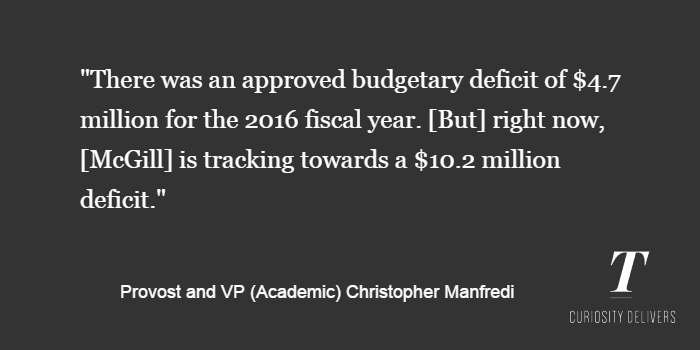McGill’s budgetary deficit is expected to be nearly $6 million more than was approved for the 2016 fiscal year, according to the Feb. 17 Senate meeting. Senate also discussed equity practices in hiring tenure-track professors and creating a new school of public policy.
Open discussion on employment equity at McGill
Professor Angela Campbell, the current chair of the Joint Board-Senate Committee on Equity, led the discussion and focused on the issue of diversity among tenure-track professors.
“The policy has not had a significant impact on diversifying the McGill community, particularly at the level of tenure-track faculty.” Campbell said.
Faculty of Medicine Senator Edith Zorychta urged McGill to improve their mentoring system for new faculty members.
“If we had a mentoring program where [new faculty members] got two mentors—one in their field to deal with the area of expertise, and another related to their own background that they feel comfortable with—[new faculty members] would be happier, less stressed, and perhaps more likely to succeed in their initial years,” Zorychta said. “It would level the playing field.”
Chloe Rourke, vice-president (VP) University Affairs of the Students’ Society of McGill University (SSMU), also raised concerns about McGill’s equity record when compared to other Canadian universities.
Campbell responded that the comparisons between McGill and other post-secondary institutions were, at times, inaccurate, as they often dealt with different subject matters—SSMU’s report compared McGill’s data on tenure-track professors with data on faculty members in general at other universities.
“We’re not comparing apples to apples,” Campbell said. “It’s relevant to look at it, but it’s not decisive. We really have to measures ourselves against a benchmark that can help us in a meaningful way to make progress in which we’re proud.”
Since Fall 2015, McGill has required that academic search committees to confirm with the Office of the Provost and VP (Academic) that at least one member of a minority group is on their candidate shortlist.
Budget planning report
Christopher Manfredi, provost and VP (Academic), delivered the budget planning report for the 2016-2017 school year, and spoke to McGill’s anticipated budgetary deficit.
“There was an approved budgetary deficit of $4.7 million for the 2016 fiscal year,” said Manfredi. “[But] right now, [McGill] is tracking towards a $10.2 million deficit.”
The increase is owed, in part, to lower than budgeted tuition revenues, and a lower Quebec grant. Manfredi also confirmed that McGill’s deficit is comparable to the deficit faced by other Quebec universities.
“We are [… at] the middle of the range,”Manfredi said. “[McGill’s] total cumulative finance deficit is a little less than $100 million, [and] we’re trying to make sure that we keep that at less than 15 per cent of our total budget.”
Manfredi also said that McGill has seen some recent positive variances, including the unanticipated sale of Redpath property for approximately $20.6 million. Faculty of Arts Senator John Galaty, expressed concern over these sales.
“In general it’s not a great idea to pay the bills by selling off assets,” said Galaty.
To reassure the Senate, Michael Di Grappa, vice principal (Administration and Finance) asserted that the deal was in the best interest of the university.
“In calculating the amount [McGill] would derive from the remaining 30 years of the lease versus the amount they offered up front, we thought it was in the best interest of the university to take this particular deal, it had nothing to do with balancing the budget,” Di Grappa said. “This particular sale has allowed [McGill] to make a provision in the budget to support a very important project in sustainability sciences.”
Report of the ombudsperson
McGill University’s new ombudsperson for students, Professor Dimitrios Berk, addressed the Senate on the rate and nature of complaints lodged by students since 2010.
“There are two major areas: academic and interpersonal issues,” Berk said. “For academic issues, the vast majority is about grades [….] The report shows that academic issues are declining; 60 complaints were lodged in 2011, versus only 17 this year—this is the good news. The bad news is that the rate of [interpersonal] issues between course instructors and students has remained constant.”
Berk concluded his presentation with a word of advice for professors and faculty members.
“Listen to the students […] it is very very important [….]” Berk said. “Most issues can be resolved just by listening”
McGill School of Public Policy
The Senate also carried a motion to create McGill’s first School of Public Policy. According to Manfredi, the program will draw from and build on McGill’s interdisciplinary knowledge and reputation, focusing on a wide range of policy-making issues.
“Many of the policies reflect McGill’s expertise,” Manfredi said. “They include health and social policy, environmental policy, education policy, governance and public service delivery [….] It goes across a whole range of things.”
According to Manfredi, the School will initially be situated within the Faculty of Arts.
“Once the school is up and running it will [become] a living organism, that will develop as other parts of the university see interest in it,” Manfredi said. “Though situated in the Faculty of Arts, the school is designed to be a multi-faculty and multi-disciplinary school.”









